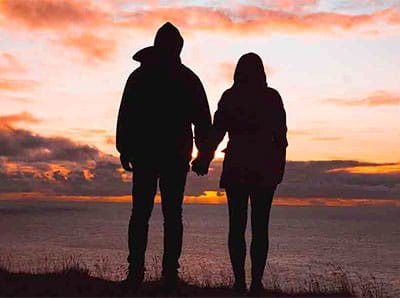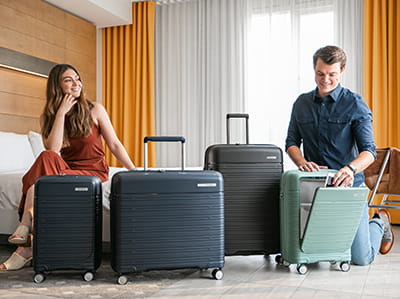
Safety Tips for Female Travelers
It’s always a good thing to review safety tips for women on the road. Women should not be afraid to travel alone–it’s doable and like most things in life, there is a manageable risk. The best advice we can give women is to follow the rules and you’ll minimize your chances of running into trouble. These tips might seem like common sense, but if you implement them into your travel style, we guarantee you’ll generally feel safer. Being over cautious might make you feel silly, but your safety is worth it.
Before You Go
- Attempting to travel with a damaged passport - can lead to unpleasant surprises, trip delays, and added expense. Consulates will not place a stamp inside a damaged passport, and even in circumstances where a visa is not required, airline officials will not allow you to board. A passport that has water damage, a significant tear, unofficial markings on the data page, torn out visa pages, holes or other type of damage, will need to be replaced. On the other hand, normal wear, such as bending of a passport after carrying it in your back pocket or the fanning of pages after extensive opening and closing is to be expected and will not require replacement.
- Be aware that electronic items - such as cell phones and laptops are subject to additional screening and that all metal items must be emptied from pockets and purses before going through airport metal detectors.
- Buy travel insurance. - Trip insurance will cover some costs of travel and cancellation in case of an emergency. In addition, insurance companies offer 24/7 emergency assistance as part of their package. Check what types of events are not covered prior to your departure.
- Carry medical and insurance information with you. - Lists of medications, medical conditions, health insurance information and contact information for your doctors at home should be with you at all times. Some insurance coverage provides access to doctors while traveling. Be sure to know how to access that help should you need it.
- Do not leave luggage unattended - or carry anything on board an airplane for someone you don’t know.
- Don’t pack car keys, travel documents, passports, visas or critical items or documents in checked luggage. - Place them in your carry on and keep them in the safe in your hotel room upon arrival.
- Fill out the Emergency information page - in your passport so that authorities are better able to help you in the event of an emergency.
- International Travelers - need to be diligent in not only getting the proper and required documents to submit for passports and visas but need to also take care to protect their passports from damage.
- Leave a copy of your passport, travel itinerary and any other important documents - with a reliable person at home who can be contacted in the event that your documents are lost or stolen. An extra copy with an extra set of passport photos can also be carried in a separate bag and can prove to be a lifesaver if needed.
- Plan on arriving at the airport - at least two hours in advance for domestic flights and three hours for international trips.
- Research where you are staying and where you are going. - Don’t go into a city or book a hotel without researching the crime and safety of the neighborhood first. It takes a few extra minutes online, and you’ll thank yourself later when you show up to check in. In most cases, busy is better. Accommodations closer to the city center tend to be busier, more people are around, walking at night in the city center is typically safe and you won’t have to walk far to get home.
- Tag all luggage - with both inside and outside identification that includes the ticketed passenger’s name, address and telephone number.
- Visit www.travel.state.gov (State Department) - and pull the Consular Information Sheet about your destination. This sheet will provide invaluable information about a variety of topics including safety and security.
Tips To Keep Your Home Safe While Traveling
- Keep it light and lifelike. - Use timers on lights, televisions, and radios to provide sound and illumination both inside and outside of your home.
- Keep it up-to-date. - Make sure your homeowners or renters insurance is up to date and that all items are insured properly.
- Keep it well-maintained. - Stop delivery of your mail and newspapers or have a neighbor or friend collect it while you’re away. In addition, arrange to have your lawn mowed and leave the air conditioner on. A silent compressor on a steamy day is a good indicator that no one’s home.
- Keep valuables out of sight. - Expensive jewelry should not be kept in the bedroom, but instead in another room or in a safety deposit box at the bank.
- Keep your home armed and secured. - Dead-bolt window and door locks. Invest in a burglar alarm that will alert police, fire or other emergency service providers.
- Leave your contact information. - In case something should happen, make sure a trusted neighbor has your cell phone or hotel number.
- Park it. - Ask a neighbor to park in your driveway, occasionally moving his or her car to indicate coming and going.
- Take inventory. - Update or start an inventory of the belongings in your home. Create a list, take photos or make a video of your more valuable items. Write down the serial numbers of all valuable goods as this can make filing an insurance claim easier.
While Traveling
- Be aware of your surroundings. - The worst possible thing you can do as a solo female traveler is to be oblivious. Be aware. You should know who is around you, peg potential threats and walk confidently. The most obvious identifier that you are a tourist is slumped posture and a tentative approach to your surroundings.
- Be cautious. - Don’t let your guard down. Be aware of your surroundings. Keep your hotel room locked at all times and make sure you know who is at the door before opening it.
- Check all closets, the bathroom and under the bed - to make sure nobody is hiding when entering the room. This can be especially helpful for women traveling alone. Asking a member of the bell staff to escort you to your room for the initial visit is another option. If you enter your room at any time and suspect that it has been entered by an unauthorized party, leave immediately and seek help from the front desk or the police.
- Check your window to make sure it is locked and functioning as applicable. - This could prevent someone from getting in, but also prevent you from getting out in the event of a fire or other emergency.
- Choose your purse carefully. - While a day pack designed with security features is ideal for travel you may prefer to carry a purse. If you do we recommend one that you wear across your torso.
- Consider requesting a floor level that you are most comfortable with. - Some people feel more comfortable with a room which is not on the first floor due to concerns over forced entry through a window. While hotels cannot always accommodate a specific floor or range of floors it doesn’t hurt to ask. Rooms closer the elevator are also safer as you are not walking down long hallways. Rooms located by the elevator may be noisier.
- Do Not Disturb - Other than when you want your room cleaned, hang the Do Not Disturb sign on your door even when you are gone. It makes others think you are inside the room. Leaving the radio, TV or a light on can do the same.
- Don’t drink excessive amounts of alcohol or gather with those who do and never accept drinks from strangers. - While it is rare, young women can be drugged through a seemingly kind offer of a drink. In these rare cases, the women have been reportedly sexually assaulted.
- Don’t leave bags unattended at any time.
- Don’t make yourself a target - by wearing expensive jewelry, and don’t carry excessive amounts of cash or credit cards.
- Dress conservatively. - Revealing tops and short skirts should be fine but, in reality, they can get you into trouble in many countries, including North America and Europe. You are always more vulnerable when you’re off your home turf so compensate by dressing conservatively.
- Familiarize yourself with the two closest emergency exits - as soon as you arrive.
- Follow your instincts. - 9 times out of 10, your instinct is right. If you feel threatened in any way, or get “a bad” feeling about a situation, follow that instinct and get out fast. Change your walking path by taking a different street, lock your things up in a hostel locker, don’t trust other travelers with your well-being. The more you travel, the more you’ll hone those instincts. Trust them.
- Have a backup plan. Always. - Don’t let yourself get lost. Always know where you are, and have at least two plans to get home. If you have to take a night bus, think about the best place to call a cab.
- Have patience. - It can take a day or two to get solo stable — to shed those initial nerves of being out there on your own managing all the details, logistics and documents. Be patient. You’ll find your strength.
- Heed travel warnings and advice - for example, avoid deserted areas of beaches where applicable.
- If you think you’re being followed. - Cross the street. Do a 180 turn. Walk toward a well-lit area. Head for a group of people. Accelerate. Enter a nearby business. If the person is still following you after you’ve changed your path, turn around and scream “what do you want?” This will probably scare them away. The tone of your voice has a lot to do with labeling you as a target, or someone to avoid. If you’re being followed by a car, turn around. It’ll take them a lot longer to turn around and follow you again. Never put yourself in a situation where you’re walking alone at night.
- If your room adjoins another, - check to make sure the door is securely locked.
- Never allow your room number to be announced by the front desk clerk. - If it is, ask for another room and ask the clerk to write the number down for you.
- Only travel in clearly marked taxis. - Do not accept rides from strangers.
- Other women are not necessarily safe. - Women often feel safer with other women. And, when it comes to small time danger, we probably are. But there are also dangerous women who are just as capable of luring you into bad situations as men. Be cautious.
- Participate in water sports from reputable vendors. - Make sure that you are sufficiently trained on the use of equipment and inquire about the operators who carry medical and liability insurance.
- Plan your first night well. - At minimum, have a place to rest your head on the first night and plan to arrive by midafternoon. It’s important to have the time to find your hotel or hostel in daylight and have time to get acquainted with your surroundings.
- Store Money and Documents in Multiple Locations. - Always keep your passport and huge cash bills in another location than your wallet. The more “hiding places” you have for your valuables the better. Spreading out your money and documents in your things means they will steal less in the event you are robbed. Always carry a backup credit card, or two, on your person. Passport security belts that go under your clothes are invaluable.
- Take care of your feet. - Nothing will ruin a trip faster than sore feet. Women’s shoes are notoriously bad for feet. Choose comfort over fashion.
- Take out your headphones. - Headphones make you an easy target. You can’t hear anyone coming up behind you. You can’t hear the announcer in the train station. You get involved in the music and before you know it, you’re an easy-target. Save the ear buds for the actual transportation portion of your trip.
- Test that the phone is working. - Make sure you know how to make an outside call and test your ability to do so.
Please wait...







